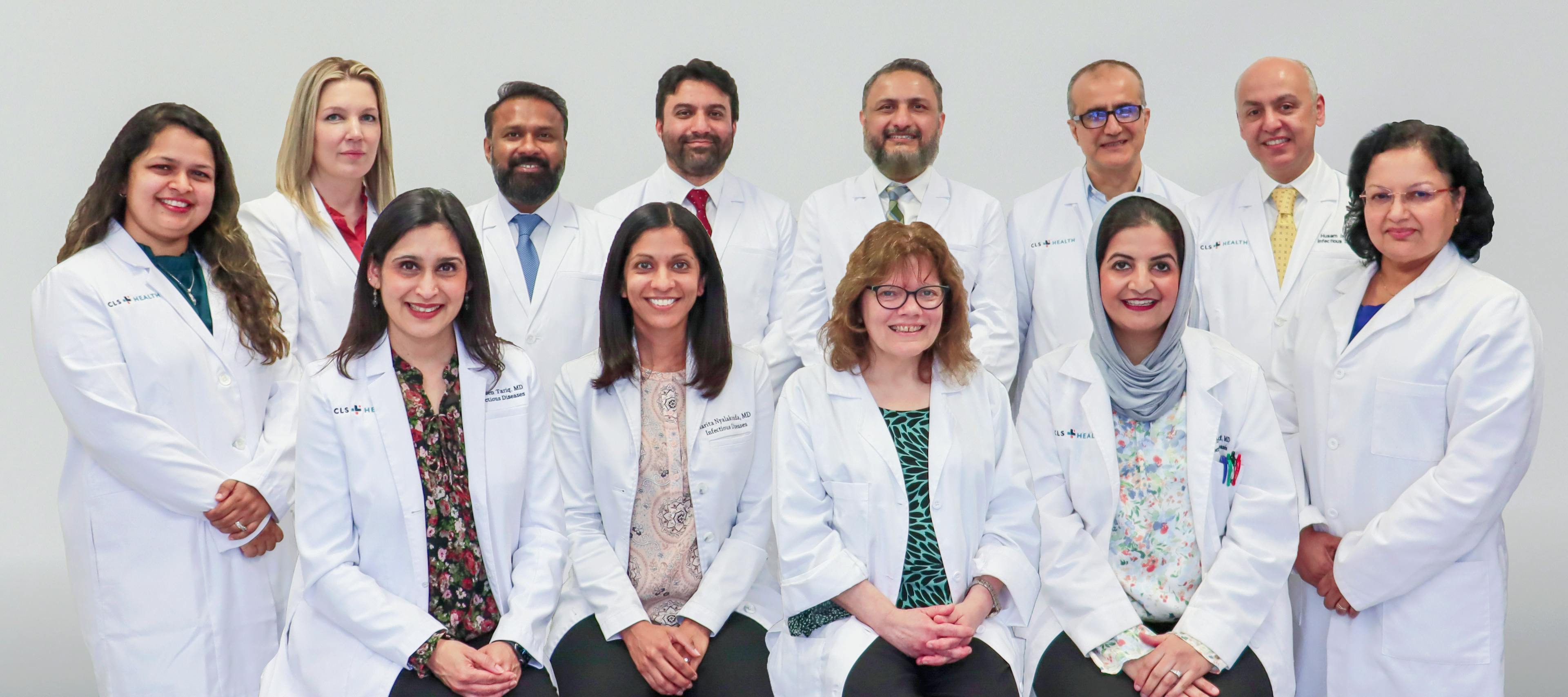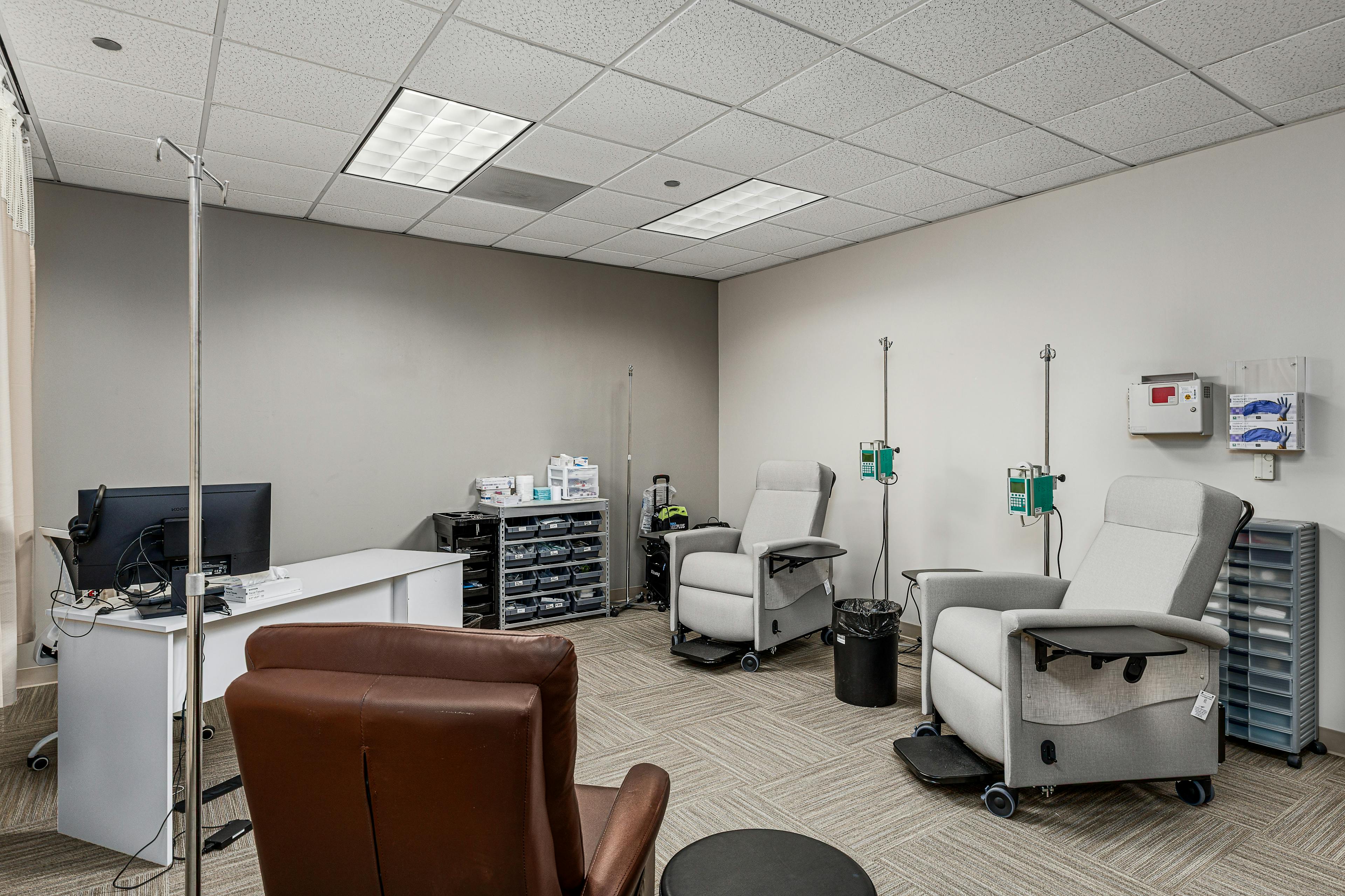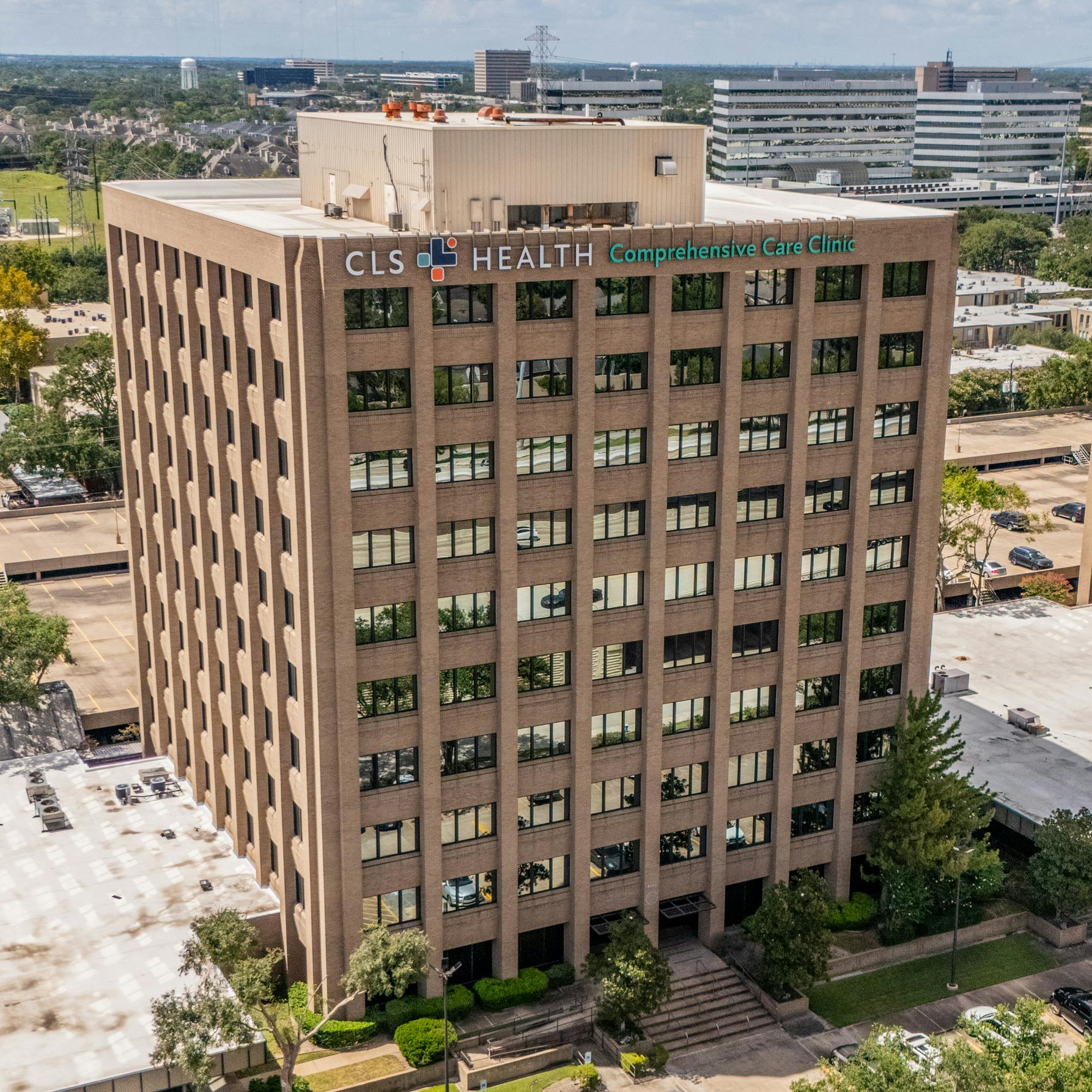Infectious Disease

Premier Infectious Disease Care
CLS Health’s experienced infectious disease specialists doctors diagnose and treat the full range of common and rare communicable diseases. Our patients receive the highest standard of compassionate, attentive, and thorough care—from initial consultations through follow-up visits.

Diagnostic Testing
We perform on-site diagnostic tests at our clinic, enabling quick decision-making and immediate commencement of treatment; these include:
- CBCs
- Blood & urine cultures
- Multiplex PCR
- X-rays, CT scans, and MRIs
For urgent cases like sepsis, IV antibiotics are administered promptly in our infusion suite.
Follow-Up Care
We ensure patients have easy access to post-discharge follow-ups, which are crucial for ongoing recovery and health management. Appointments can usually be scheduled within 24 to 48 hours for urgent needs, and within a week for routine visits.
Providers

Infectious Diseases

Infectious Diseases

Infectious Diseases

Infectious Diseases

Infectious Diseases

Infectious Diseases

Infectious Diseases
Conditions Treated
- Bone and Joint Infections – Includes osteomyelitis, orthopedic infections, and prosthetic joint/device infections.
- Endocarditis (Heart Infections) – Bacterial infections affecting heart valves and inner heart lining.
- Sepsis (Blood Poisoning) – A life-threatening response to infection spreading throughout the body.
- Tuberculosis (TB) – A bacterial lung infection that can spread to other organs.
- Diabetic Foot Infections – Chronic wounds and infections due to poor circulation and diabetes-related complications.
- Spine Infections – Bacterial infections affecting vertebrae or spinal discs.
- Intra-Abdominal Infections – Includes peritonitis, diverticulitis-related infections, and abscesses.
- Surgical & Post-Operative Infections – Infections developing after surgical procedures.
- Urinary Tract Infections (UTIs) – Recurrent or complicated bacterial infections affecting the bladder, kidneys, and urinary system.
- Clostridium difficile (C. diff) Infections – A bacterial infection causing severe diarrhea and colitis, often linked to antibiotic use.
- HIV/AIDS & Chronic Hepatitis B and C – Comprehensive management for viral infections affecting the immune system and liver.
- Influenza (Flu) & Other Respiratory Viral Infections – Diagnosis and treatment of severe or recurrent viral respiratory infections.
- Post-Transplant Infections – Opportunistic viral infections in immunocompromised patients following organ transplants.
- Fungal Infections – Includes invasive and systemic fungal infections affecting the lungs, skin, or internal organs.
- Diseases Acquired in Foreign Countries (Tropical Diseases) – Post-travel infectious disease diagnostics and treatment for malaria, dengue, chikungunya, and other tropical infections.
- Central Nervous System Infections – Includes meningitis, encephalitis, and brain abscesses.
- Chronic Fever of Unknown Origin – Investigation and management of long-term, unexplained fevers.
Wound Care – Infection management for chronic wounds, pressure ulcers, and non-healing post-surgical wounds.
Treatments & Services
- Outpatient Infectious Disease Evaluations – Comprehensive diagnostics for acute and chronic infections.
- Chronic Infection Evaluation & Management – Ongoing care for persistent, relapsing, or drug-resistant infections.
- Pre-Travel Immunizations & Counseling – Essential vaccines and preventive medications for malaria, yellow fever, and traveler’s diarrhea.
- Infection Control Programs – Strategies to prevent hospital-acquired infections and antimicrobial resistance.
- IV Antibiotics – For severe bacterial infections such as osteomyelitis, sepsis, and endocarditis.
- IV Antifungals – Targeted treatment for invasive fungal infections.
- IV Antivirals – Used for HIV/AIDS, hepatitis, and severe viral infections.
- IV Immunoglobulin Therapy (IVIG) – For immune-deficiency-related infections.
- IV Steroids / Biologicals – Used in severe inflammatory or autoimmune-related infections.
Total Parenteral Nutrition (TPN) – For patients unable to tolerate oral or enteral nutrition due to infection-related complications.
Infusion Therapy Services
CLS Health offers a range of infusion therapy services administered in the patient’s home or at our office-based Infusion Center. The choice between home and office infusions is determined by factors such as medication type, treatment frequency, insurance, and patient mobility.
What is Infusion Therapy?
Infusion therapy, also known as intravenous infusion (IV), involves administering medication directly into the bloodstream through a needle or catheter. It is prescribed when medical conditions cannot be effectively treated with pills or other oral medications.
Home Infusion
With home infusion, our nursing staff thoroughly educates patients or families on how to self-administer medication while in the comfort of their own homes.
In-Office Infusion Centers
CLS Health provides safe and convenient access to infusion therapy and associated services at one of our onsite Infusion Centers in Houston and Webster, TX.
In-office infusions allow patients to receive treatment under our direct supervision and reduce the reliance on home health services.
With experienced staff administering medications under the supervision of an attending physician, we prioritize patient safety in every encounter. Recliner chairs and free Wi-Fi access offer additional comfort and convenience.

In-Office Infusion Services include:
- Medication administration via peripheral IV lines and PICC or central lines.
- Maintenance of access lines.
- Essential lab tests to monitor patient’s conditions throughout their treatment.
- Interpreters for non-English speaking patients.
Frequency of Treatments
The frequency and duration of infusion therapy depend on the type of infection and its severity, ensuring a personalized treatment schedule based on each patient’s specific health needs.
Don't see your insurance listed? We may still accept it! CLS Health updates accepted insurance plans regularly. Please call (281) 724-1860 to verify your coverage.
- Aetna Select
- Open Access Selects
- Elect Choice
- Aetna Open Access Elect Choice
- Aetna Choice POS II
- Managed Choice
- Open Choice PPO
- Aetna Medicare Advantage Plans
CLS Health does not accept:
- Aetna CVS Marketplace Plans
* Some providers may not accept this insurance, please call to confirm
- Superior Ambetter Core (Complete, Clear, Focused, Standard Silver and Gold)
- Superior Ambetter Value (Clear Value Silver, Focused Value Silver, CMS Standard Silver & Gold Value, Everyday Value Gold)
- Superior Ambetter Virtual (Ambetter Virtual Access Silver, CMS Standard Virtual Access Basic Silver, Ambetter Virtual Access Gold)
- Superior Health Plan CHIP*
- Superior Health Plan MAPD (Medicare Advantage Prescription Drug)
- Superior Health Plan Medicare
- Superior Health Plan MMP Medicaid*
- Superior Health Plan MMP Medicare
- Superior Health Plan STAR*
- Superior Health Plan STAR Kids*
- Superior Health Plan STAR+PLUS*
CLS Health participates in most Blue Cross Blue Shield plans including:
- Blue Choice PPO
- Blue Essentials
- Blue Essentials Access
- HealthSelect
- HealthSelect of Texas In Area
- Consumer Directed HealthSelect in Area
- HealthSelect of Texas Out of State
- Consumer Directed Health Select Out of State
- HealthSelect Secondary 65+
- Medicare Advantage HMO
- Medicare Advantage PPO
- Medicare Advantage Value HMO
- POS
- Traditional/Par Plan
- TRS-Active Care
- TRS-Care Standard
- BCBS MyBlue Health (Marketplace)
*Some providers may not accept Community Health Choice, please call to confirm
- MarketplacePremier
- Medicaid*CHIPCHIP PerinateSTAR
- Medicare AdvantageDual-Special Needs Plan (D-SNP)
CLS Health accepts most Cigna plans, including:
- Cigna HMO
- Cigna Local Plus
- Cigna Open Access Plus
- Cigna PPO
- ChoiceCare PPO
- EPO
- HMO
- HMO Premier
- Medicare Advantage Plans
- HumanaChoice - Medicare Advantage PPO plan
- Humana Gold Choice - Medicare Advantage Private Fee-for-Service (PFFS) plan
- Human Gold Plus - Medicare Advantage HMO & Special Needs Plan
- Military (TRICARE South Region Military Health Plan)
- POS - including Choice POS, National POS Open Access/Plus and Preferred POS Open Access.
- PPO
*Some providers may not accept United Healthcare, please call to confirm
- Commercial, HMO, POS, EPO and PPO Plans (Charter, Choice,Core, Doctors Plan, Freedon, Heritage, Navigate, Nexus ACO, Options PPO, Passport Connect, Select)
- Indemnity
- Medicare Advantage (AARP, Care Improvement Plus, C-SNP, D-SNP, I-SNP, Erickson Advantage, ERS Medicare Advantage, TRS-Care Medicare Advantage, UnitedHealthcare Chronic Complete, UnitedHealthcare Connected (Medicare-Medicaid Plan), UnitedHealthcare Dual Complete, UnitedHealthcare Group Medicare Advantage PPO, United Healthcare Medicare Complete)
- Community Plans* (CHIP, CHIP Perinate, Star, Star Kids, Star Plus, MMP)
- Wellmed (Wellmed Dual SNP Focus, Wellmed Medicare Advantage Focus)
*Some providers may not accept Wellpoint, please call to confirm
- Medicaid (All Texas Plans Including the Below)*
- CHIP
- CHIP Perinate
- STAR
- STAR+PLUS
- STAR Kids
- Medicare Advantage
- C-SNP
- D-SNP
- I-SNP
- Medicare Advantage HMO
- Medicare-Medicaid (MMP)
- Medicare-Medicaid Program (MMP)
- STAR+PLUS MMP
*Some providers may not accept insurance, please call to confirm
PPO Networks
- Beechstreet PPO
- Carnival Cruise Lines PPO
- Envolve Benefit Options Vision-PPO, HMO
- First Health
- Curative/First Health
- Galaxy Health Network
- HealthSmart Preferred Care
- Accel
- Healthsmart Payors Organization
- Multiplan PPO
- Tricare (Humana) PPO/Prime
Employer-Specific Plans
- Brazoria County Employees – Aetna TPA Brazoria County Employees
Workers’ Compensation Plans
- Workers’ Comp
- Auto & Workers’ Comp
Medicare and Medicare Advantage
- Medicare Traditional
- Medicare Advantage
- Memorial Hermann Health Solutions Commercial and Medicare
- Molina Medicare Complete Care HMO SNP
- Medicare-Medicaid Program (MMP)
- STAR+PLUS MMP
- Alignment Health Plan
- AllyAlign Health
- American Health Plans
- Florida Complete Care
- Gold Kidney Health Plan
- Imperial Health
- Independent Health
- Kaiser Foundation Health Plan of Washington
- Kaiser Foundation Health Plan of Colorado
- Mass Advantage
- Presbyterian Health Plan
- PriorityHealth
- Provider Partners
- SCAN
- UCare
- Vantage Health Plan
- Verda Healthcare
- Zing Health
Medicaid and CHIP Programs
- Molina Healthcare* (Marketplace, Medicaid, CHIP, CHIP Perinate, STAR, STAR Kids, STAR+PLUS)
- Texas Children's Health Plans*
- TMHP (Traditional Medicaid) Traditional Medicaid
Specialty Plans
- VA Community Cares Network CCN
FAQs
Infectious diseases are caused by pathogens such as bacteria, viruses, parasites, and certain fungi. They range from common infections like colds and flu to more severe illnesses like AIDS. These diseases can be contagious, spreading directly or indirectly from person to person. Transmission methods include airborne, blood-borne, insect-borne, food-borne, water-borne, and direct skin contact. Viral infections are generally more contagious than bacterial ones.
It is necessary to provide all previous medical records pertaining to your disease, including X-rays, laboratory readings, and immunization records.
You should inform your infectious disease specialist regarding all current medications you are on and any specific allergies. The list of medications should include non-prescription medicines too.
Preventive measures include practicing good hygiene, such as regular handwashing with soap and water, especially before eating or touching your face. Staying up to date with vaccinations, avoiding close contact with sick individuals, and following safe food and water practices are also crucial in preventing infections.
Yes, some individuals can carry and transmit infectious diseases without showing symptoms; these individuals are known as asymptomatic carriers. For example, diseases like typhoid fever and certain viral infections can be spread by individuals who do not exhibit any signs of illness.
An infectious disease (ID) physician specializes in diagnosing and treating infections that do not require surgery. They manage diseases caused by bacteria, viruses, fungi, and parasites, including severe conditions like AIDS and meningitis.
ID physicians develop personalized treatment plans and advise on preventive measures, such as immunizations. Your primary care physician may refer you to an ID specialist if an infection is difficult to control or associated with a high fever. With advanced diagnostic tools, ID physicians can identify the cause of your infection and provide optimal treatment.
You should seek medical attention if you experience severe symptoms, such as high fever, difficulty breathing, rapid heart rate, or if your symptoms worsen or don't improve with initial treatment. Additionally, if you have a weakened immune system or chronic health conditions, it's important to consult a healthcare provider promptly when signs of an infection appear.
It's imperative to provide all previous medical records related to your condition, including X-rays, laboratory results, and immunization records. Inform your ID specialist about all current medications, including non-prescription drugs, and any allergies. This comprehensive information aids in accurate diagnosis and effective treatment planning.
An ID physician reviews your medical history, including X-rays and lab reports. A physical examination may be conducted to gather evidence for diagnosis. Laboratory tests, such as blood samples, cultures from wounds, or antibody detection, may be ordered to identify the infection's cause.
Infusion therapy involves administering medication directly into a vein using a needle or catheter. In infectious diseases, it's often used for antibiotics that require precise dosing or aren't effective orally. This method ensures rapid delivery of medication into the bloodstream, which is essential for serious infections.
During infusion therapy, a healthcare professional inserts a needle or catheter into a vein, typically in your arm. The medication is then administered over a set period, which can range from minutes to hours, depending on the treatment. You'll be monitored for any adverse reactions throughout the session.
While generally safe, infusion therapy can have risks, including infection at the injection site, inflammation of the veins (phlebitis), or allergic reactions. Healthcare providers take precautions to minimize these risks, such as using aseptic techniques and monitoring patients during treatment.








